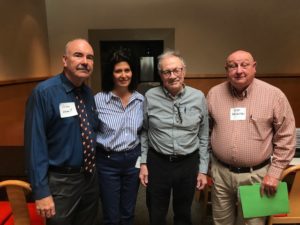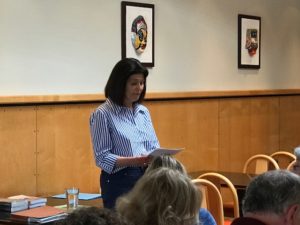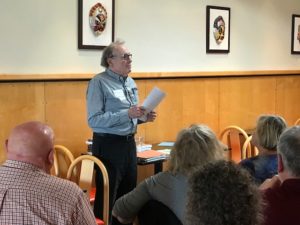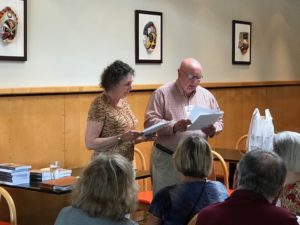The Horatio Society, a west coast subgroup of the Shakespeare Oxford Fellowship, met on August 20th at the King Yen Restaurant in Berkeley, California, marking their first meeting in many years. At the event, John Hamill, Katherine Chiljan, Ramon Jiménez, and Ugo Baldassari made brief presentations. [Ed. note: If you would like to host an authorship event in your area, or have someone speak on the authorship question to your school, club, or other group, contact the SOF Speakers Bureau at info@shakespeareoxfordfellowship.org.]

John Hamill opened the event and asked the 30 attendees to introduce themselves and to reveal how they became involved in the authorship question. John also updated the group on the Shakespeare Oxford Fellowship’s upcoming annual conference this October in Chicago as well as the Research Grant Program. He emphasized that the Fellowship’s Research Grant Program is the only entity in the world that provides research funds for Oxfordian research and any financial contribution to it is welcome. John also informed the group about the upcoming debate in London on September 21, with Stratfordian scholar Sir Jonathan Bate and DeVere Society Chairman Alexander Waugh. The debate should be available online after the event.
 Next, Katherine Chiljan spoke about John Ward who moved to Stratford-upon-Avon in late 1662 to take his post as church vicar. Almost immediately, Ward made two notations about Shakespeare in his diary: Shakespeare had a £1000 yearly allowance to supply the stage and he died after a “merry meeting” with writers Michael Drayton and Ben Jonson. Since no known Shakespeare biography existed at the time (beyond a sparse paragraph in Fuller’s Worthies), these statements should be treated seriously. The supposed £1000 annuity was so enormous that only the government could have issued it. The only known dramatist to receive a grant of this amount was Edward de Vere, 17th Earl of Oxford, although the reason for it was unspecified. The Shakespeare in the drinking bout with Drayton and Jonson could have been the Stratford Man; his physician son-in-law once treated Drayton, who frequented the Stratford area. Jonson presumably knew the Stratford Man since he satirized him in at least one play, which even Shakespeare academics accept. A kernel of truth about the Stratford Man’s character may be contained in a legend first recorded in the 18th century: Shakespeare goes to nearby Bidford for heavy drinking and, on his way back, sleeps under a crab-apple tree. Interestingly, Shakespeare’s comedy, The Taming of the Shrew, opens with a drunken man “before an alehouse” in the country; he later mentions two towns near Stratford-upon-Avon. Oddly, Ward’s notations about Shakespeare stopped five months after his Stratford move, although he continued his diary for another 19 years. This raises the possibility that Ward doubted the great author’s association with Stratford soon after his move there.
Next, Katherine Chiljan spoke about John Ward who moved to Stratford-upon-Avon in late 1662 to take his post as church vicar. Almost immediately, Ward made two notations about Shakespeare in his diary: Shakespeare had a £1000 yearly allowance to supply the stage and he died after a “merry meeting” with writers Michael Drayton and Ben Jonson. Since no known Shakespeare biography existed at the time (beyond a sparse paragraph in Fuller’s Worthies), these statements should be treated seriously. The supposed £1000 annuity was so enormous that only the government could have issued it. The only known dramatist to receive a grant of this amount was Edward de Vere, 17th Earl of Oxford, although the reason for it was unspecified. The Shakespeare in the drinking bout with Drayton and Jonson could have been the Stratford Man; his physician son-in-law once treated Drayton, who frequented the Stratford area. Jonson presumably knew the Stratford Man since he satirized him in at least one play, which even Shakespeare academics accept. A kernel of truth about the Stratford Man’s character may be contained in a legend first recorded in the 18th century: Shakespeare goes to nearby Bidford for heavy drinking and, on his way back, sleeps under a crab-apple tree. Interestingly, Shakespeare’s comedy, The Taming of the Shrew, opens with a drunken man “before an alehouse” in the country; he later mentions two towns near Stratford-upon-Avon. Oddly, Ward’s notations about Shakespeare stopped five months after his Stratford move, although he continued his diary for another 19 years. This raises the possibility that Ward doubted the great author’s association with Stratford soon after his move there.
 Ramon Jiménez shared insights from his recently completed book Shakespeare’s Apprenticeship or A New Analysis of the Earliest Plays by the Real Shakespeare. His book provides evidence and makes the argument that five anonymous plays performed during Elizabeth’s reign were written by Edward de Vere, 17th Earl of Oxford, and belong in the Shakespeare canon. The Famous Victories of Henry the Fifth, The True Tragedy of Richard the Third, The Troublesome Reign of King John, The Taming of a Shrew and King Leir are Oxford’s first versions of plays in the canon that bear nearly identical names. Each of them is strikingly similar in terms of plot and cast to its canonical counterpart. Four of the five have strong connections to de Vere and for all of them there is convincing evidence that they were written during the 1560s, but the dialogue in each of them has been entirely rewritten. Virtually all scholars, critics, and editors of Shakespeare have overlooked, disputed, or disparaged the idea that he had anything to do with them. Nor have they been discussed or included in collections of Shakespearean Apocrypha. This addition of five plays to the Shakespeare canon will introduce a new facet to the authorship debate and supply further evidence that Oxford is the real Shakespeare.
Ramon Jiménez shared insights from his recently completed book Shakespeare’s Apprenticeship or A New Analysis of the Earliest Plays by the Real Shakespeare. His book provides evidence and makes the argument that five anonymous plays performed during Elizabeth’s reign were written by Edward de Vere, 17th Earl of Oxford, and belong in the Shakespeare canon. The Famous Victories of Henry the Fifth, The True Tragedy of Richard the Third, The Troublesome Reign of King John, The Taming of a Shrew and King Leir are Oxford’s first versions of plays in the canon that bear nearly identical names. Each of them is strikingly similar in terms of plot and cast to its canonical counterpart. Four of the five have strong connections to de Vere and for all of them there is convincing evidence that they were written during the 1560s, but the dialogue in each of them has been entirely rewritten. Virtually all scholars, critics, and editors of Shakespeare have overlooked, disputed, or disparaged the idea that he had anything to do with them. Nor have they been discussed or included in collections of Shakespearean Apocrypha. This addition of five plays to the Shakespeare canon will introduce a new facet to the authorship debate and supply further evidence that Oxford is the real Shakespeare.

Ugo Baldassari and his friend Marti Litchman presented a few scenes of his play, Shaking Spears. Ugo has set out to spread the Oxfordian message to a wider audience using one of Edward de Vere’s most favored forms of entertainment, a stage play, and, more specifically, a romantic comedy. The play is set in two time periods, Elizabethan and Contemporary, which are intertwined throughout the arc of the action. The unifying focus is London’s Bishopsgate area, the site of Fisher’s Folly (Silexedra), de Vere’s prodigious hothouse of artistic activity during the 1580s, and a trendy neighborhood today providing Londoners with cafés, restaurants, shops, and theatres. At Silexedra, the Earl of Oxford regales his bohemian cohorts with stories from his recent trip to the Continent while preparing entertainments for the Court, where he is headed for big trouble. Meanwhile, in modern London, two cronies, a famous Oxfordian actor and an eminent Stratfordian professor, debate their points of view. Both of them head towards crises of conscience as the discovery of a “smoking gun” manuscript draws them into a harrowing detective chase.
Afterwards, Ramon and Joan Leon invited everyone to appetizers and drinks at their home nearby. About 15 people met at the house and continued the discussion. The Horatio Society has plans to hold another session in a few months.


